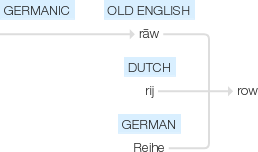Row
Old English rāw, of Germanic origin; related to Dutch rij and German Reihe .
wiktionary
From Middle English rewe, rowe, rawe, from Old English rǣw, rāw, probably from Proto-Germanic *raiwō, *raigwō, *raih-(“row, streak, line”), from Proto-Indo-European *reyk-(“to carve, scratch, etch”). Cognate with dialectal Norwegian rå(“boundary line”), Middle Dutch rīe, Dutch rij(“row, line”), Old High German rīga(“line”), rihan(“to string”), Middle High German rige(“line, row, ditch”), rīhe(“row, line, corridor”), German Reihe(“row”), Middle Low German rēge, rīge, Old Norse rega(“string”), Middle Dutch rīghe, Dutch rijg, rijge, German Riege(“sports team”).
From Middle English rowen(“to row”), from Old English rōwan(“to row”), from Proto-Germanic *rōaną(“to row”), from Proto-Indo-European *h₁reh₁-(“to row”). Compare West Frisian roeie, Dutch roeien, Danish ro. More at rudder.
Unclear; some suggest it is a back-formation from rouse, verb.
etymonline
row (n.1)
"series of people or things in a more or less straight line," Middle English reue, from late Old English reawe, rewe, earlier ræw "a row, line; succession, hedge-row," probably from Proto-Germanic *rai(h)waz (source also of Middle Dutch rie, Dutch rij "row;" Old High German rihan "to thread," riga "line;" German Reihe "row, line, series;" Old Norse rega "string"), which is possibly from PIE root *rei- "to scratch, tear, cut" (source also of Sanskrit rikhati "scratches," rekha "line").
The meaning "a number of houses in a line" is attested from mid-14c., according to OED chiefly Scottish and northern English. The meaning "line of seats in a theater" is by 1710. The meaning "line of plants in a field or garden" is by 1733, hence the figurative phrase hard row to hoe attested from 1823, American English.
row (v.)
"propel (a vessel) with oars or paddles," Middle English rouen (mid-14c .), from Old English rowan (intrans.) "go by water, row" (class VII strong verb; past tense reow, past participle rowen), from Proto-Germanic *ro- (source also of Old Norse roa, Dutch roeien, West Frisian roeije, Middle High German rüejen), from PIE root *ere- "to row." The figurative phrase row against the flood "attempt what is difficult" is from mid-12c. The muscle-building rowing-machine is attested by 1848.
row (n.2)
"noisy commotion," 1746, Cambridge student slang, of uncertain origin, perhaps related to rousel "drinking bout" (c. 1600), a shortened form of carousal. Klein suggests a back-formation from rouse (n.), mistaken as a plural (compare pea from pease).
